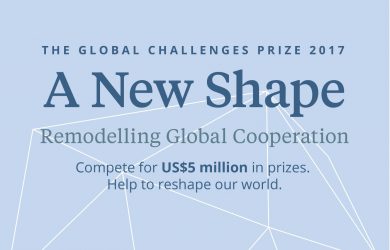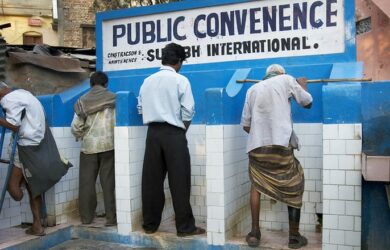- ABOUT US
- RESEARCH
- EDUCATION
- The Graduate School
- PhD Programme
- MSc Programmes
- Capacity Development
- News
- Design and Evaluation of Public Policies (DEPP)
- Design and Evaluation of Innovation Policies (DEIP)
- Evidence-Based Policy Research Methods (EPRM)
- Migration Management Diploma Programme (MMDP)
- Moving the Migration Policy Agenda Forward (MMPAF)
- Online Courses
- Short Courses (Masters)
- Tailor-made programmes
- UNU-MERIT, ITU Academy Training Centre
- Alumni
- Academic Funding
- NEWS
- EVENTS
- PUBLICATIONS
- LIBRARY
Ukraine and the SDGs: How the war has influenced global development
06 March 2024
A guest post by Anna Cherevko, Ukrainian national and current student in our 2023-2024 MPP cohort The UN Sustainable Development Goal (SDG) 16 – encompassing peace, justice, and strong institutions – happens to sit at the bottom of the list of the SDGs, and can therefore sometimes be seen as less important or crucial than some of the other goals. However, I can say from my personal background that experiencing war in one’s native country results in a completely different perspective on the...
Continue Reading →Earth Day Special: Top 2023 sustainability reports to know
19 April 2023
Covering climate change to green tech, here are the key findings from this year so far! We’re halfway through our self-set timeline to achieving the Sustainable Development Goals (SDGs) and fast approaching the 2030 deadline of the framework put forth in the Paris Agreement on Climate Change, so it seems that now is the right moment to reflect on the following questions: 🟢 Where do we stand? 🟢 What opportunities are there to overcome our challenges and grow in new directions? 🟢 Where do we go fr...
Continue Reading →Science, Technology & Innovation: How well are we serving the SDGs?
13 April 2023
In an effort to track the global alignment between science, technology and innovation (STI) and the Sustainable Development Goals (SDGs), a consortium of seven universities led by UNU-MERIT researcher Tommaso Ciarli released the Steering Research and Innovation for Global Goals (STRINGS) report – a project funded by UK Research and Innovation (UKRI) in collaboration with the UN Development Programme (UNDP). In this interview, Tommaso Ciarli shares the main findings of this research with Le...
Continue Reading →Debating the future of development economics: An evening with Jeffrey Sachs
10 July 2019
"In a way, he has a vision that is more eclectic, more theoretical than somebody like Helen Clark, who would be more practical and policy-minded. But their concerns are more or less the same: the future of the planet and sustainable development. They simply take different approaches."...
Continue Reading →Our day with Helen: Fighting for equality, leading by example
23 May 2018
“Does having women in power empower women per se?” This was the bold question put to Helen Clark, former chief of UNDP, during a one-hour debate co-hosted by UNU-MERIT and Maastricht University — and it was a question that got a suitably robust response! PhD fellow Ibrahima Kaba, our moderator for the afternoon, peppered and quizzed Ms. Clark about prospects for Africa, the future of the UN, and the viability of the Sustainable Development Goals. Given her recent run to be th...
Continue Reading →UNU speaks truth to power at the #SDGGlobalFest
04 April 2018
‘Leave no one behind’ is one of the boldest commitments in the UN’s 2030 Agenda. But what exactly does this mean? UNU-MERIT’s Prof. Shyama Ramani and Dr. Maty Konte joined the Global Festival of Action for Sustainable Development in Bonn, March 2018, to explain our work and efforts in this regard. In so doing they stressed the importance of research, outreach, and evidence-based policymaking to ensure that truly no one is left behind....
Continue Reading →Breaking silos, nudging communities: The SITE4Society adventure
20 February 2018
Governments worldwide have pledged to achieve the Sustainable Development Goals (SDGs) by 2030. But given the scale of the task, not even national governments can manage alone. This has sparked a new phenomenon: whereby non-governmental players – from start-ups to social enterprises to multinationals – are aligning strategies and working toward the same sustainable ends. This new reality is also an opportunity to study how these supposedly ‘selfish’ players can be corralled for the common good. ...
Continue Reading →What Lies Beyond the Poverty Line: Real Hope or Harsh Reality?
11 April 2017
Reports on the fight against global poverty are often optimistic — sometimes too optimistic. Part of the problem is “our” reliance on a simplistic measure, which draws an absolute poverty line of $1.90 per day in so-called 2011 international purchasing power parity. What can we do differently and where should we draw the line in our attempts to eradicate extreme poverty? The leading international source on poverty statistics, the World Bank, has many sophisticated measures avai...
Continue Reading →UNU Action Debate: Global Challenges Prize 2017
09 March 2017
The UN wants to achieve the Sustainable Development Goals by 2030. But, as many of us are acutely aware, the SDGs are not only ambitious but also complicated. A kaleidoscope of grand visions, the 2030 Agenda aims to rebuild our world from the ground up, in a work plan covering everything from the environment to education to peace and security. And linked to the 17 goals, there are 169 targets and 230 indicators. For The Economist magazine: “these are ambitions on a Biblical scale and not in a go...
Continue Reading →Why it’s easier for India to get to Mars than to tackle its toilet challenge
19 November 2016
In 2013, India became the fourth country in the world (after Russia, the United States and the European Union) and the only emerging nation to launch a Mars probe into space. But it remains part of the group of 45 developing countries with less than 50% sanitation coverage, with many citizens practising open defecation, either due to lack of access to a toilet or because of personal preference. According to the Indian census of 2011, only 46.9% of the 246.6 million households in India had their ...
Continue Reading →Archives
Contact
UNU-MERIT
Boschstraat 24
6211 AX Maastricht
The Netherlands
T: +31 43 388 44 00
Email: info@merit.unu.edu
Boschstraat 24
6211 AX Maastricht
The Netherlands
T: +31 43 388 44 00
Email: info@merit.unu.edu
Partner sites
Newsletters
© 2024 UNU-MERIT | Maastricht University













